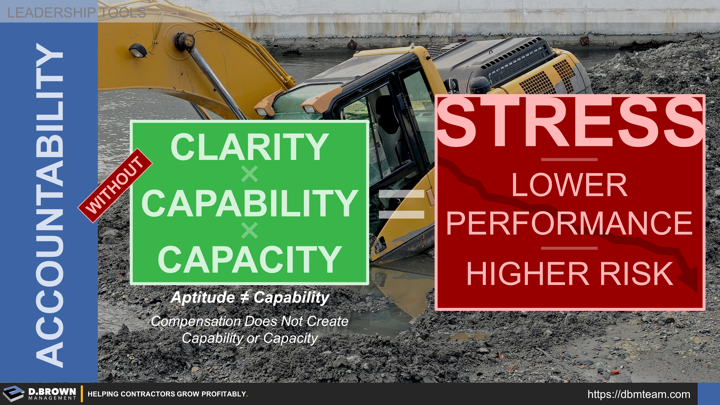We see words like accountability and "ownership" thrown around a lot and wielded poorly by managers at all levels. Accountability is as frequently misused as words like communication and trust. This is due to a lack of understanding just like poor understanding of financial terms such as gross margin, labor burden, equipment costs, indirect costs, and overhead.
THE PREREQUISITES
Clarity: First of all, when defining accountability there must be clarity and that clarity progresses through six stages of standards. Those accountabilities that make up all job roles within your business model must work together to create the overall outcomes you are looking for in the business. If you don't have this figured out, then you don't truly have clarity at the business level. Start here.
The second half of clarity is that they must be clear to the people who are in the job role. Remember that everyone is capable of dealing with varying levels of complexity and ambiguity. It is not whether the accountabilities are clear to you but rather that they are clear to everyone in the role. Feedback mechanisms, training, and management all work together to reinforce this clarity.
Capabilities: Someone can have clarity around what is expected of them but not have the capabilities. Desire does not create capabilities. Accountability does not create capabilities. Compensation does not create capabilities. Only training, coaching, management, and deliberate practice over time will create capabilities. As a contractor grows, they will add more and more support systems which will enhance capability development.
Capacity: Someone can have the capabilities but not the capacity to achieve what is expected of them. That capacity may be at the individual contributor level, or it may be some other resource constraint like budgetary boundaries. They may make up for this in the short-term by working longer but that is not sustainable in the long-term. Performance often decreases with sustained overload which is why it is considered one of three enemies of lean.
Without clarity, capability, and capacity, the accountability will lead to higher levels of stress which will decrease performance and lead to higher levels of risk. There is the physical risk that shows up on a jobsite when crews are working sustained overtime, leaving them more prone to errors and accidents. In the office there is similar risk when it comes to customer satisfaction, financial performance, and the development of people.
This is not about being soft on someone. Remember the stress-performance curve and that people do their best work and develop the fastest when they are under an appropriate level of stress. This is about proper design of the organization, business model, and resource management. Without the 3 Cs, managers will struggle to achieve their two basic accountabilities. Also remember that feedback is great, but scorecards are only one small part of what a great manager does.

